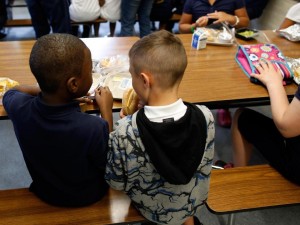
All Boston Public School students will be provided free school lunches this school year, regardless of their parents’ or guardians’ financial circumstance, school officials are expected to announce Tuesday, according to the Boston Globe.
By eliminating tedious and “potentially invasive” paperwork, the federal program hopes to provide students who come from low-income families with free lunch everyday.
“This takes the burden of proof off our low-income families and allows all children, regardless of income, to know healthy meals are waiting for them at school every day,” said Mayor Thomas Menino in a prepared statement.
Other cities including Atlanta, Chicago, and Detroit have begun, or will be participating, in the meal plan. Starting next year, the free lunch program will be offered nationwide in any school district with high concentrations of students from low-income households. The free meals will be paid for by the federal government.
Last school year, Boston Public Schools offered free breakfast to students from low-income households, while more affluent students often went without the same “free milk, pastries, or other items.”
About three-quarters of Boston’s 57,000 students last year were eligible to receive free or reduced price lunch, Boston Globe’s James Vaznis reports.
Officials believe more students would have qualified if the proper paperwork had been filled out and filed.
Understandably, many schools were reluctant to turn away students who could not afford lunch in the past. Instead, the lunch would be charged to a parent’s or guardian’s account. Last year alone, the School Department piled up $350,000 in unpaid lunches. The loss was covered by other parts of the budget.
Michelle Obama’s “Let’s Move!” initiative to end child obesity launched the universal free lunch and breakfast plan in 2010. To participate, a certain percentage of students in a district must qualify for free meals. One of the deciding factors: percentage of families in the community who receive food stamps.
The Agricultural Department selected only nine states and the District of Columbia to participate. Boston school officials, however, helped bring the program to Massachusetts last summer.
The Food Research and Action Center, an organization that promotes in-school meals, will be putting out a stud in the next couple of weeks concerning the number of students taking advantage of the free lunch program.
